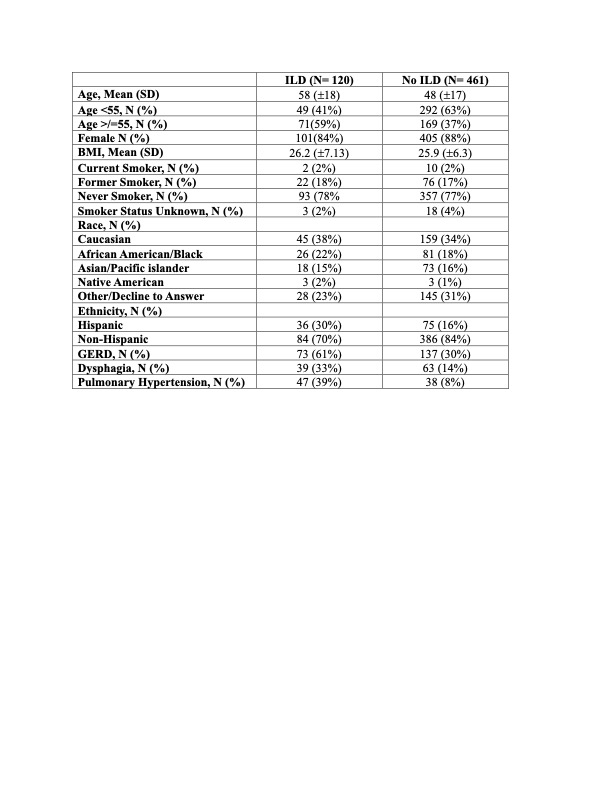Session Information
Date: Monday, October 27, 2025
Title: (1147–1190) Miscellaneous Rheumatic & Inflammatory Diseases Poster II
Session Type: Poster Session B
Session Time: 10:30AM-12:30PM
Background/Purpose: Mixed connective tissue disease (MCTD) is a rare autoimmune condition defined by the presence of anti-U1-ribonucleoprotein (RNP) antibodies and clinical features of at least two other connective tissue diseases (CTDs). Pulmonary complications, including interstitial lung disease (ILD), are the leading causes of morbidity and mortality in this population. The clinical phenotype, natural history, and risk factors for ILD in MCTD remain poorly characterized. This study aims to evaluate the prevalence of MCTD and characterize clinical differences between MCTD patients with and without ILD.
Methods: We conducted a retrospective review of patients seen within the UCLA Health System between April 1, 2005, and April 1, 2025. Eligible patients had a CTD ICD-10 code of either M35.1 or M35.9, were at least 18 years of age, and had a positive anti-U1-RNP antibody. Individuals with a medical history of systemic sclerosis, rheumatoid arthritis, systemic lupus erythematosus, or inflammatory myositis were excluded. Patients with ILD were identified based on diagnosis documentation in the electronic medical record. Odds ratios (ORs) with 95% confidence intervals (CIs) were calculated to assess differences in clinical and demographic characteristics between MCTD patients with and without ILD.
Results: A total of 581 patients with MCTD were included in the study. The majority were female (86.9%) with a mean age of 50 years (range: 18–96) (Table 1). The cohort was racially diverse, with 35.3% identifying as Caucasian, 18.4% as Black/African American, and 15.7% as Asian/Pacific Islander. ILD was present in 120 patients (20.7%). Patients with and without ILD did not differ significantly in terms of sex, body mass index (BMI), race, or smoking status. However, patients with MCTD and ILD were significantly more likely to be over the age of 55 (OR 2.50; 95% Cl: 1.62–3.86), ethnically Hispanic (OR 2.21; 95% CI 1.40-3.49), report dysphagia (OR 3.03; 95% CI: 1.85–4.95), and have documented diagnoses of gastroesophageal reflux disease (GERD) (OR 3.66; 95% CI: 2.37–5.70), as well as pulmonary hypertension (PH) (OR 7.13; 95% CI: 4.24–12.10).
Conclusion: This study represents the largest evaluation of patients with MCTD and underscores the notable burden of ILD in this population. Universal screening for ILD in MCTD remains controversial. The present study sheds light on the distinguishing clinical features of patients with MCTD-ILD (e.g., older age, Hispanic, GERD, dysphagia, PH) that if present, could prompt evaluation for ILD and lead to earlier diagnosis.
 Table 1. Characteristics of patients with MCTD with and without ILD (Nf581)
Table 1. Characteristics of patients with MCTD with and without ILD (Nf581)
To cite this abstract in AMA style:
Haussmann A, Volkmann E. Interstitial Lung Disease in MCTD: A Retrospective Cohort Study at a Large Tertiary Medical Center [abstract]. Arthritis Rheumatol. 2025; 77 (suppl 9). https://acrabstracts.org/abstract/interstitial-lung-disease-in-mctd-a-retrospective-cohort-study-at-a-large-tertiary-medical-center/. Accessed .« Back to ACR Convergence 2025
ACR Meeting Abstracts - https://acrabstracts.org/abstract/interstitial-lung-disease-in-mctd-a-retrospective-cohort-study-at-a-large-tertiary-medical-center/
